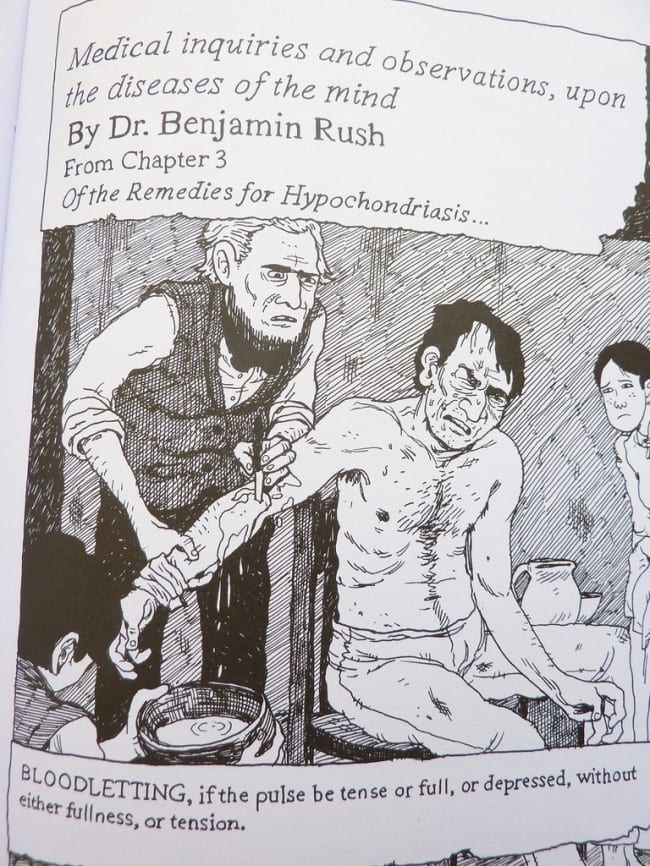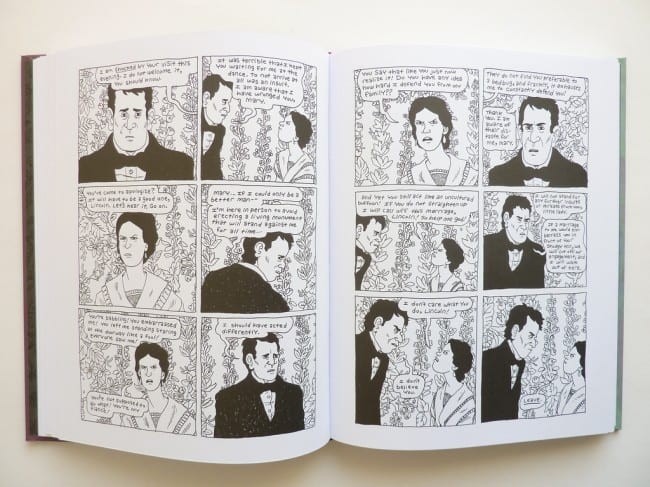Noah Van Sciver has spent much of his short career drawing ugly figures. He revels not so much in the grotesque but rather the mundanely unpleasant. His figures tend to be sweaty, slouching, lumpy, and oddly-shaped--and that goes for his ostensibly attractive characters, too. I think this tendency is a natural outgrowth of his art style, one rooted in the grotesque and absurd and has continued to be a trademark of his work as he's grown as an artist. There's no question that he's made a fairly significant leap as both a draftsman and a storyteller in a relatively short period of time (about 3-4 years), and that labor has culminated in his first book, The Hypo. Subtitled "The Melancholic Young Lincoln", it picks up in 1837 and ends with the future president's 1842 wedding to Mary Todd. The book was obviously meticulously researched and puts Van Sciver's skill at depicting the everyday nature of ugliness to good use as a muddy, dirty and generally unpleasant Springfield, Illinois comes alive in a less-than-idealized fashion. The Lincoln of Van Sciver's book is one dealing with crippling depression, personal setbacks, poverty & debt and powerful loneliness. He's a perfect anti-hero of sorts, one whose attempts at doing things wind up being disastrous and who is at the mercy of fate more than once.
What's remarkable about the book is the elegant and even beautiful way Van Sciver solves storytelling problems, often dropping away from the grimy realism of the book for near flights-of-fancy. There's a lovely scene where young Lincoln spots future wife Mary Todd from across the room and uncharacteristically demands a dance, and then winds up charming her with his forthrightness. In a book where Van Sciver makes a point of laying on dense cross-hatching in every background scene, this dance features just the two of them on a panel-free page, moving the eye from the upper left hand corner to the middle right and back down to the lower left. It's a perfect depiction of the confluence of motion and heady conversation that can occur on the dance floor.

There's another scene where a down-and-out Lincoln, suffering from depression, is treated by a doctor whose methods of treating mental illness speak to the way that the malady was understood in the 19th century. Van Sciver juxtaposes the text from an article detailing "the remedies for Hypochondriasis" with images of Lincoln undergoing bloodletting, a warm bath, a cold bath, and finally receiving mercury in his mouth to produce salivation as a cure for his debilitating condition. There's a major set piece involving Lincoln getting roped into accepting a duel and the ways in which he manages to psych out his improvement, like clearing brush with his sword as a crazy person might.

It is a natural thing, I think, given Lincoln's historical status and achievements, for most American authors to want Lincoln to be a heroic figure and to portray him as such. Van Sciver is careful not to sentimentalize his depiction of Lincoln while still hinting at the qualities that would one day make him great. Or rather, the qualities that would allow him to make a number of difficult and unpopular decisions as president. Lincoln at this point of his life had just helped to push through a bill that wound up bankrupting the state of Illinois, was dumped by his fiancee, was abandoned by his first law partner, and ended his courtship of Mary Todd after being told by her brother-in-law that he wasn't considered a worthy enough suitor. Despite all of that, Lincoln had a wicked sense of humor (quick with a bon mot and capable of holding a crowd's attention with a good yarn, both of which Van Sciver demonstrates with a variety of anecdotes), intense integrity, and strong ambition.

Van Sciver carefully develops a number of supporting characters in the book. Joshua Speed is a funny counterpoint to Lincoln's introverted, lonely character--he's the man whose bed Lincoln slept in for quite some time when he arrived in Springfield to set up his law practice. He was also a notorious philanderer, with "a different woman in his bed every night", and Speed teased Lincoln into trying to loosen up, resulting in a hilarious and botched visit to a brothel that Van Sciver depicts Lincoln mumbling "I'm up to no good" to himself as he trudges over. Mary Todd is a strong-willed, whip-smart, and hilarious presence who is drawn to Lincoln's poetic nature (the scene where they quote Shakespeare to each other is absolutely charming) and who, in Van Sciver's hands, slightly resembles Lucy Van Pelt. She's certainly the original fussbudget, but she's drawn to Lincoln's Charlie Brown personality, in part because while Lincoln may have suffered from depression, he was far from wishy-washy.
Van Sciver's greatest achievement in this book is his storytelling restraint. He lets his cross-hatching gets across the grime of a Springfield that wasn't as civilized as its inhabitants might have thought. He wants to show the reader a different side of the Lincoln we grew up reading about in the history books, but also wants the reader to connect this younger man to the future president. More than anything, he wants to show Lincoln as in some ways a very typical young man: he makes stupid decisions, is fickle in his attentions (Lincoln falls for Todd's younger sister), and has no idea what to do with his life (while knowing he wants to do something great), and even engages in cruel humor at someone else's expense.
That comes out in the book's best sequence, as Lincoln and Todd write vicious, biting letters under a false name to the editor of the local newspaper regarding the dumb policy decisions of the state's auditor. When the auditor finds out it's Lincoln, he demands either a full apology or an (illegal) duel to get satisfaction. Lincoln continues to feel the effects of "the hypo" in the form of bright spots in front of his eyes as he suffers from the anxiety that this incident creates, but he doesn't back down and in fact manages to outsmart his opponent by his choice of weapon (the broadsword, a weapon which works to his advantage because of his reach) and his crazy energy prior to the duel. The duel is called off at the last minute as everyone manages to back down and Lincoln confronts his future brother-in-law, determined to wed Mary. The book ends with that wedding, which is tense with Lincoln's mixed feelings about both Mary and himself. This is a densely rendered book with a tone alternating between light and dark. It's about a born performer who is filled with self-doubt, a lonely man whose self-loathing renders those women who are attracted to him as filled with flaws, a sharp man who makes dumb decisions and a kind man filled with empathy who nonetheless can be ruthless and cruel. Van Sciver gets across that like all of us, Lincoln was full of contradictions, was all too well aware of those contradictions, and took a while to negotiate those contradictions. It's a fine first major work for a young cartoonist.







